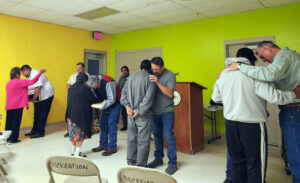
WASHINGTON (BP)–Amid escalating violence perpetrated by the Taliban in Pakistan, two reports on the status of Christians in the country contain varying details.
The Washington-based International Christian Concern reported that two Christians were executed and others were physically abused by Taliban militants in Karachi April 21 after the Christians protested orders from the Taliban to convert to Islam or die.
A subsequent report by Compass Direct News, though, said the execution-style killings could not be verified. Baptist Press asked ICC to confirm the initial report, and the group was attempting to do so at press time. In their news releases, both Compass Direct and ICC relied on comments from individuals who were not on the scene.
ICC reported April 24 that pro-Taliban graffiti messages were written on two churches in Karachi, including the phrases “Long Live the Taliban” and “Embrace Islam or Prepare to Die.” Christians complained to the government and then staged a peaceful protest, the watchdog group said.
Following the protest, more than 100 masked Taliban militants invaded the community with automatic rifles, causing Christian residents to hide in their homes.
“Some of the attackers entered homes and pillaged money and jewelry and abused the women and burned their properties,” Asif Stephen, a Christian in Karachi, told ICC. “The elderly were injured, and one child fell to the ground and died in my friend’s arms.”
As the militants went door to door, ICC reported that they dragged some people into the streets by their hair while shouting for the Christians to convert to Islam. When two Christians resisted, the militants killed them execution-style in front of their families, ICC said.
Compass Direct, meanwhile, reported that the graffiti on churches called for Christians to convert to Islam or pay a hefty tax for protection. As church members erased the graffiti, armed men intervened to stop them. Soon about 40 others arrived and fired haphazardly at the crowd, leaving several injured, Compass Direct said. One of the most seriously injured was a child.
Police arrested seven suspects at the scene and recovered an arms cache of semiautomatic weapons, Compass Direct said. Another source told Compass that after firing on the crowd, the Taliban ransacked Christian houses and burned down one, also burning Bibles and beating women on the street.
The unrest comes after Pakistani officials agreed to implement Sharia law in the former resort region of the Swat Valley in February in an effort to appease the Taliban, who vowed to end their year-long insurgency in return.
“The Pakistani government has created an opening for terrorists to attack Christians indiscriminately by acceding to their demands in the Swat Valley,” said Jeremy Sewall, ICC’s advocacy director. “Formerly, Christians in the major cities of Pakistan experienced discrimination, but up till now they had not had to fear threats of forced conversion or execution on a wide scale.
“This attack is a harbinger of worse to come if the Pakistani government continues to cower in the face of Muslim radicals,” Sewall said.
Afghanistan’s president, Hamid Karzai, and other world leaders warned that the Sharia law deal could have dire consequences for the region, including human rights abuses and unintended assistance to militants.
“The decision of the Pakistan government to impose Sharia law on entire regions of Pakistan in concessions aimed at pacifying a spreading Taliban insurgency has brought about the unfortunate and expected results of greater persecution of religious minorities in Pakistan,” Joseph Grieboski, president of the Institute on Religion and Public Policy, said. “Hindus and Sikhs are fleeing the Swat region with no help whatsoever from Islamabad [Pakistan’s capital].”
According to a news release from IRPP April 22, Taliban leaders have strengthened their hold in the Swat Valley over the past two years, demolishing about 200 all-girls schools, beheading local officials and flogging a 17-year-old girl for refusing to marry a militant commander.
“Wherever Sharia has been imposed as the basis of controlling any society — as is the case in Saudi Arabia and Iran — adherents of non-Muslim traditions and women have been the immediate casualties,” Ishani Chowdhury, director of public policy at the Hindu American Foundation, said in the news release. “We join with the IRPP and many other human rights advocates in condemning the events in the Swat Valley that testify to the perverse nature of Taliban justice and Pakistan’s inept central government.”
The New York Times reported April 27 that the Taliban also has branched out from their stronghold in the Swat Valley to other districts, including Dir and Buner. Residents of Dir were fleeing the area as schools and markets were closed and the town was under curfew. The Times said the Taliban “took effective control of Buner” a week ago, closing the courts and announcing they would soon open courts based on Sharia law.
American officials have urged Pakistan to stop the militants, The Times said, expressing fears that the Taliban soon could threaten the country’s civilian government.
The Washington Post said April 29 that senior U.S. security officials had held “nearly nonstop discussions” on Pakistan during the previous two days and the escalating Taliban threat would usurp the agenda when the presidents of Pakistan and Afghanistan meet jointly with President Obama in Washington in early May.
House Majority Leader Steny Hoyer, D.-Md., told reporters that Congress too is “very concerned about what’s happening in Pakistan.”
The Taliban had advanced to within 60 miles of Islamabad, with the government there showing reluctance to intervene, The Post said. On Wednesday, the Pakistani military claimed to have reasserted control of Daggar, a key town taken by the Taliban last week.
“By their imposition of Islamic Sharia in Swat, [President Asif Ali] Zardari and the Pakistani Parliament are undermining and destroying any hope for a liberal democracy in Pakistan and protection of fundamental rights in the entire country,” Grieboski of IRPP said.
–30–
Compiled by Baptist Press staff writer Erin Roach.
















